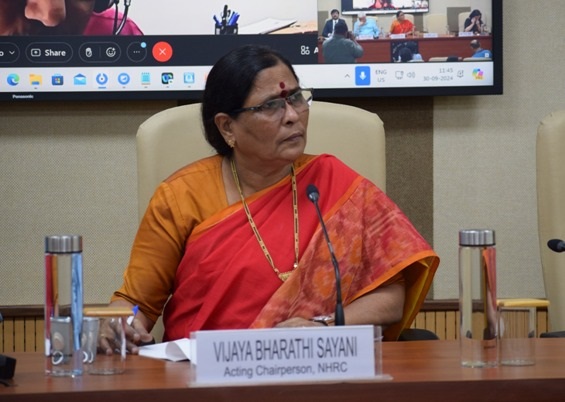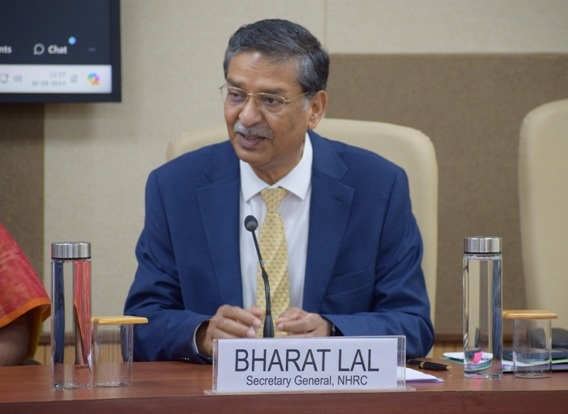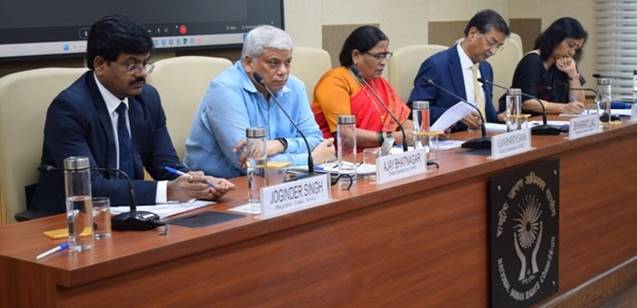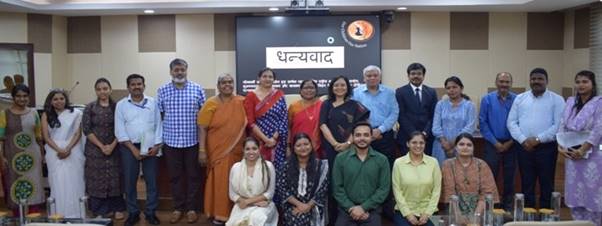National Human Rights Commission
NHRC, India Open house discussion on the Rights of Children of Sex Workers and Marginalized Communities concluded with several suggestions
Despite several safeguards, many children still face stigma, poverty, and limited access to essential resources perpetuating the cycle of their vulnerability and discrimination, Says NHRC Acting Chairperson, Smt Vijaya Bharathi Sayani
The discussions emphasized the urgent need for empirical data and research on their challenges along with an impact assessment of various government schemes for them
Among various other key suggestions, the employment and active engagement of trained social workers to foster trust and facilitate access of these children to necessary services also stressed
Making the mother’s name of children mandatory on the government portals instead of the father’s suggested
Posted On:
01 OCT 2024 8:03PM by PIB Delhi
The Open House Discussion organized in hybrid mode by the National Human Rights Commission (NHRC), India concluded with several suggestions to ameliorate the cause of human rights of Children of Sex Workers and Marginalized Communities at its premises in New Delhi. The discussion aimed to foster a comprehensive understanding of the systemic issues at play and to generate actionable solutions for ensuring a more equitable future for all children.
Chairing the discussion, Smt. S. Vijaya Bharathi, Acting Chairperson, NHRC emphasized the need for protecting the rights of children of sex workers and marginalized communities. She highlighted India's rich cultural heritage that traditionally values the protection and empowerment of children. She also cited various constitutional provisions and laws protecting child rights. However, she said that despite several safeguards, many children still face severe challenges such as stigma, poverty, and limited access to essential resources, which perpetuate cycles of vulnerability and discrimination.

Smt. Bharathi urged collective action from policymakers, educators, and community members to create supportive environments and advocate for equitable access to education and healthcare for all children to explore their potential and aspire for a brighter future. She outlined the NHRC's critical role in ensuring the protection of rights for all including children, advocating for the assessment of current programs, and addressing gaps to promote inclusivity and equitable development for the children from the marginalized section of the society.
Before this, in his opening remarks, Shri Bharat Lal, Secretary General, NHRC underscored the importance of fundamental facilities, such as education and healthcare, for these vulnerable children. He emphasized the necessity of prioritizing children's health and nutrition while acknowledging the government's ongoing initiatives in this regard. He highlighted the disparities in children's rights arising from geographic and socio-economic factors and discussed efforts to enhance the education of tribal children through the Eklavya Model Residential Schools, with plans to establish one school in each block and significant funding allocated for both plain and remote areas. Despite these advancements, he recognized the persistent challenges in improving basic services and educational opportunities for marginalized children.

He also noted the Commission's active engagement, including the Acting Chairperson's visits to various schools and childcare institutions. He remarked on the potential of technology to provide equitable educational access to children from NT/DNT communities, thereby aligning their opportunities with those available to urban children. He stressed the need for concerted efforts to bridge gaps in various indicators of child development and growth relative to the national average.
Smt. Anita Sinha, Joint Secretary, NHRC gave an overview of the open house discussion and highlighted the significant challenges the children of sex workers and marginalized communities face—such as social stigma, limited access to education and healthcare, and increased vulnerability to exploitation while emphasizing the importance of creating supportive environments for their development. She also highlighted the initiatives of the NHRC on the issues concerning the Rights of Children.

The first session explored the rights of children of sex workers and their challenges, including social stigma, lack of access to education and healthcare, and heightened vulnerability to exploitation. In the second session, the rights of children from marginalized communities were discussed, highlighting their specific needs and barriers to accessing essential services. Finally, the discussions focused on the way forward, innovative strategies and collaborative efforts among the various stakeholders—including policymakers, NGOs, and civil society organizations—to enhance the protection and promotion of these children's rights.
Some of the key suggestions that emerged during the discussions were as follows:
• There is an urgent need for empirical data, necessitating research focused on the wide range of challenges faced by the children of sex workers and children from marginalized communities along with an impact assessment of various government schemes;
• Capacity-building and sensitization programs for teachers, police officers, social workers and law enforcement officials are necessary to sensitize them to the unique backgrounds and experiences of these children, facilitating better communication and understanding;
• Proper documentation, such as Aadhar cards, should be made accessible to these sex workers and their children to facilitate their admissions to schools and the processes of obtaining their necessary identification and documentation should be streamlined;
• The government portals should mandatorily provide the mother’s name instead of the father’s. The option to give the name of the guardian should be added;
• Ensure proper implementation of existing schemes and laws designed to protect the rights of children of sex workers and marginalized communities;
• Developing community-based care models tailored to the unique needs of these groups is required to provide holistic support to these children;
• There is also a crucial need for the employment and active engagement of trained social workers to foster trust and facilitate access to necessary services for the children of sex workers and marginalized communities.

The Open House Discussion was attended by Shri Ajay Bhatnagar, Director General(Investigation), Shri Joginder Singh, Registrar (Law), NHRC Shri Sanjeev Kumar Chadha, Addl. Secretary, Ministry of Women and Children (MWCD), Shri Ganga Kumar Sinha, Deputy Secretary, Ministry of Home Affairs (MHA), Smt. Meenakshi Negi, Member Secretary, National Commission for Women (NCW), Shri Ajay Srivastava, Economic Adviser DoSJE, Ministry of Social Justice and Empowerment, Smt. Naseema Khatoon, Founder Parcham, Ms. Lalita SA, Vice President Society for Participatory Integrated Development (SPID), Mr. Prabhat Kumar, Child Protection Specialist, UNICEF, Prof. (Dr.) Asha Bajpai, Former Professor of Law Founding Dean, School of Law, Rights & Constitutional Governance, Tata Institute of Social Science, Shri Jaya Singh Thomas, Founder/General Secretary, Chaithanya Mahila Mandali (CMM), Prof. Neena Pandey, Professor, Department of Social Work, University of Delhi, Prof. (Dr.) Paromita Chattoraj, Professor of Law, National Law University, Odisha, Dr. Veerendra Mishra, (IPS) Director, Samvedna Smt. Uma Subramanian, Director, Rati Foundation, Shri Siddharth Pillai, Co-Founder Rati Foundation, Advocate Sneha Singh, Child Rights Lawyer, Shri. Ajeet Singh, Founder and Director, Guria, Prof. Jyoti Dogra, University of Delhi, Ms. Priya Krishnan, Representative from Kat-Katha, Smt. Subhasree Raptan, Programme Manager, Goran Bose Gram Bikash Kendra (GGBK), Smt. Bishakha Laskar, Secretary, Durbar Mahila Samanwaya Committee.
***
NSK
(Release ID: 2060872)
Visitor Counter : 934